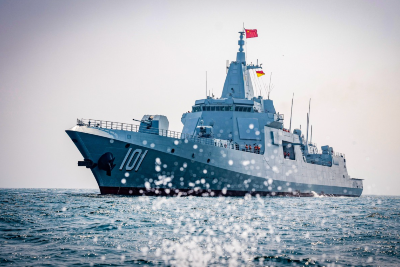In early July, a fleet of four Chinese warships transited international waters within the U.S. EEZ around the Aleutian Islands. According to Nathaniel Herz, reporting for the Northern Journal, U.S. commercial fishermen observer the 418-foot, Legend Class, Coast Guard cutter, Kimball steaming through the area at 21 knots. “It turned out the Kimball was in hot pursuit of four Chinese ships, including a destroyer and a guided-missile cruiser,” reports Herz.
Herz notes that there was some communication between the Chinese vessels and the Coast Guard. “This is the China Navy Task Group. I noticed you are close to us; please maintain safe distance to avoid collision,” the Chinese reportedly radioed to the U.S. ship.
According to the U.S. Coast Guard, the Kimball and an American HC-130 Hercules plane shadowed the Chinese vessels for more than 12 hours as they transited the Aleutians. Herz reports that at one point the Coast Guard warned the Chinese of unprofessional behavior after detecting a possible drone.
“The Chinese naval presence operated in accordance with international rules and norms,” said Rear Adm. Megan Dean, Seventeenth Coast Guard District commander. “We met presence with presence to ensure there were no disruptions to U.S. interests in the maritime environment around Alaska.”
According to the Chinese, their ships were conducting a “Freedom of Navigation Operation,” similar to operations exercised by U.S. warships in international waters near China.
“The Coast Guard, in coordination with U.S. Northern Command, was fully aware of and tracked the Chinese naval presence,” says the Coast Guard’s July 9 press release. “In September of 2021 and 2022, Coast Guard cutters deployed in the Bering Sea also encountered Chinese surface action groups.”
The Honolulu-based Kimball patrolled under Operation Frontier Sentinel, a Coast Guard operation designed to meet presence with presence when strategic competitors operate in and around U.S. waters.
For some observers the Chinese missile cruisers were a wake-up call. China has signaled its intention to play a significant role in the region as a “near Arctic State,” and is currently a signatory to the Central Arctic Ocean Fisheries Agreement, which establishes a moratorium on commercial fishing in the Arctic Ocean until 2037.







